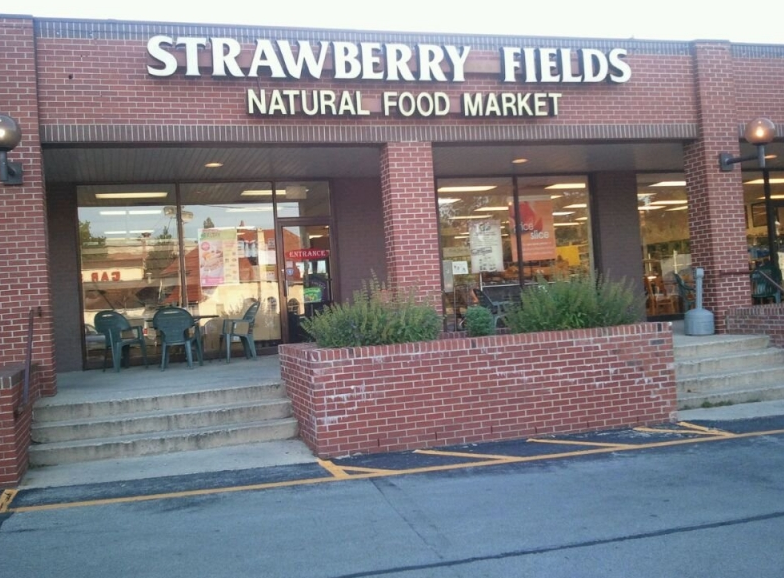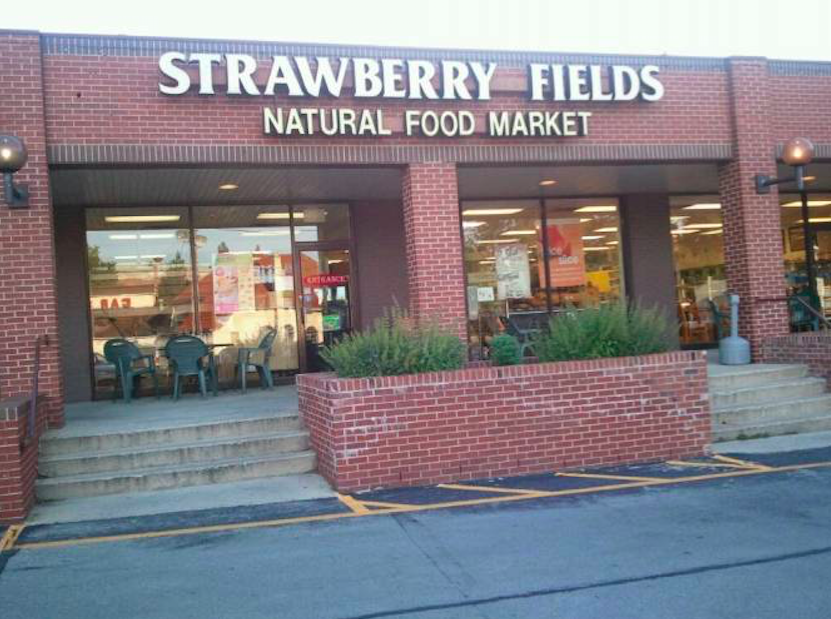Some of my early sensory memories center around hummus. The thickness, the smell of it, the nuanced and variable texture, the authenticity of the thing. I remember using my curious child’s brain to look carefully at each new plastic cup to determine precisely the amount of garlic that had been added to this batch, monitoring carefully the changing trends of what I considered one of the chief delicacies in my life. There was a ritual to buying hummus at Strawberry Fields. I remember the walk to the counter on the North side of the store and the deep and earthy smell that always came to me in a heady rush as I clutched my mother’s hand. This is the flood of memories that always surfaces when I think about this place and the space it has occupied in my life.
I am, with everything that comes along with it, a local boy. I have been moving within the Champaign-Urbana community for my entire life, and moments of passion and contextual memory such as these are nothing strange to me for I am attached intrinsically. They surface frequently, that is what happens when one is part of a community. I have seen the sights, smelled the smells, and they are linked not only to emotion but to the concrete things that constitute the our city.
Champaign-Urbana is older now, and so am I. We have both changed and grown steadily to match the pace of a new millennium and the pressures and opportunities that this brings. As I grew older, my relationship with Strawberry Fields changed. I could try my best to link this change in my own perception to the other things in my life that had also began to change. I was becoming more independent, thinking on my own now. I was going places without my parents and making my own choices about the things I consumed and how I spent my time and money. These factors do a lot of work to throw off the affective magic of an establishment, in this case, Strawberry Fields. It is a matter of the effects of wonder and memory being thrown off and replaced with the criticism of a consumer. But always, something lingered, an attachment working independently of my changing perceptions.

I’m sure that I am not alone in feeling this way. Much of our community has spoken out about the lasting effect that their experiences at this store has had on their lives. As I am writing this, I am talking to my friend and he brings up memories of walking to their once-thriving lunch counter on Sundays from the nearby Unitarian Church. He talks about the hummus as well. His eyes lose focus a little, and a dreamy quality comes into his normally very serious voice. He is rapt.
Local business owner Mohammad Al-Heeti speaks of his past in a more practical sense, reminiscing on how Strawberry Fields was his way to provide him with foods and comforts otherwise unavailable in our community when he first came to CU in the early 1980’s. Talk to anyone who spent time here in the 80’s and 90’s and they will tell you similar stories, of a beloved local business that filled a particular niche in their lives. They will continue to express these feelings to this day, feeling linked to a business which has provided much for them.
I think it is incredibly important to consider the ways in which this nostalgia felt about a local business might skew the way we look at it as time passes and the problems that this can create for our sense of community.
The homemade hummus, in my memory, went first. It used to be thick and whipped and incredibly fresh. It was replaced instead by a third party brand, package and vacuum sealed and lacking in flavor. I noticed that my family and I went less and less. Why indeed, when we could no longer buy our favorite products? We could buy the same food at a local chain grocery store for much less, along with the rest of our shopping. The cafe, a favorite spot for lunch and coffee, was losing money. An ever growing selection of competitive options and issues with supply costs and minimum wages proved fatal for the operation. It was replaced largely by an ever-spreading selection of herbal supplements, pills, and the trappings of homeopathic medicine.
This supplement-oriented department had once filled a relatively small part of their storefront, but now occupied a much larger section of their retail space. Faced with competition from the internet, this venture lost money as well. It was no longer a lively spot for lunch and coffee but now felt more like a cold and clinical grocery store, similar in atmosphere but lacking the economic viability necessary to sustain itself in this sense.
These changes coincided with factors separate from the local management. Amirah Zaveri writes an article before the recent closing of Strawberry Fields and interviews the general manager, Jack Wallace. He cites competition from comparable businesses such as Common Ground Food Cooperative and the declining health of the original founder, Paul Dohme as factors in the decline of the business. In 2014, Strawberry Fields closed, with an uncertain future.
Ultimately, at the time of its closing I felt betrayed by Strawberry Fields — what a strange thing to feel about a grocery store. It went out of business as a result of many concrete factors within the community completely separate from the emotions that surrounded it, yet I experienced none of these. I feel a longing for what it once was, to go back to the thing that I depended upon, but I think that this points to the intangibility and importance of that thing we call community. Because, simultaneously, I think it is entirely too easy to become fossilized in the way we feel about the way things once were. We can be trapped by things existing as what we remember, and let these emotions turn us away from thinking ahead to the future.

Common Ground has now successfully filled the niche once occupied by Strawberry Fields within C-U. With a second store planned for construction as early as 2016, it would be hard for Strawberry Fields to reclaim its original place as a seller of high quality organic and local produce, and for them to depend entirely on this market for their ultimate success. Rather, I think it is our responsibility as changing, thinking individuals to not recapture something lost but use our continuing passions to help encourage local businesses to grow and change the landscape of our city.
Mohammad Al-Heeti, the same man who became enraptured with Strawberry Fields and the sense of home it created for him in the 80’s, has the potential to do this. I think he is well on his way. He is already a successful business owner, and he has discussed plans to turn the new business in a new direction. If he succeeds, I hope he can navigate the complex task of balancing those intangible things that we may feel about the place we live with the incredibly necessary task of looking towards the future and creating new, wonderful experiences.
And still, I have high hopes for the hummus.
Photos from Yelp.








